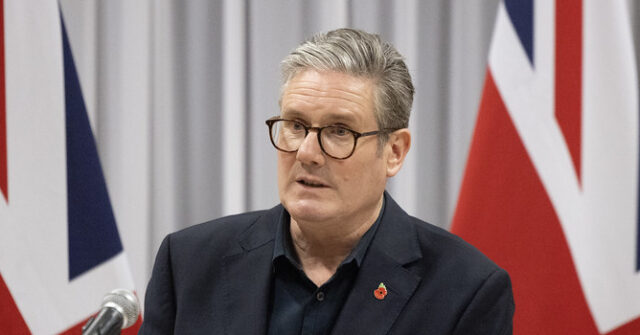Britain’s left-wing Prime Minister Sir Keir Starmer laid down covering fire for his Chancellor’s budget, which will set tax and spending for the next year. He said he was taking “tough decisions” and decrying those who criticised their plan as “populists” offering “easy answers.”
While the new government ‘Halloween horror’ budget coming on Wednesday will be shocking, it will likely not be terribly surprising, given the endless doom-mongering and teasing out of the punishment to come the Labour government has been delivering for the past 115 days.
That continued today, with Prime Minister Sir Keir Starmer saying in a speech in Birmingham that “it’s time to embrace the harsh light of fiscal reality”, an apparent bid to fend off yet more criticism for himself and Chancellor Rachel Reeves.
The remarks from Starmer were laden with deeply paternal language, framing Labour’s desire to tax and spend more as the only conceivable possible route forward. He said today: “It’s time to choose a clear path, and embrace the harsh light of fiscal reality so we can come together behind a credible, long-term plan. It’s time we ran towards the tough decisions, because ignoring them set us on the path of decline.”
Those who offered alternatives to the Labour vision of hammering the pubic and business with more taxes — The Times suggests £35 billion of tax hikes may be coming on Wednesday — Starmer will say are a “populist chorus of easy answers” and should be ignored. Starmer said of his tax and spend that his government is embarking on: “Borrowing that will drive long term growth. Tax rises to prevent austerity and rebuild public services.”
The tax hikes are expected to include an increase in employment tax—the tax paid by companies in return for having employees—and a freeze on tax thresholds. The latter is simply a continuation of the long-standing Conservative policy of ‘stealth taxation,’ which has hammered families for years.
As previously reported, the stealth taxation of fiscal drag uses the ratchet of inflation to turn the guns of the punishment tax bands originally created to soak the rich onto middle-income working people. As written of the Conservatives when they used this exact trick:
The impact of this, which has been going on for decades but has reached “totally unprecedented” levels under the present Conservative administration, is best seen in the upper tax bracket, which was first created decades ago to punish the super-wealthy. Today, a failure to adjust the threshold as inflation soars has seen upper-working and middle-class occupations like teachers, nurses, and police officers dragged into the punishment band.
As late as 2003 not a single nurse in the UK paid tax in the top band, but a decade later tens of thousands did, and now hundreds of thousands do. Nurses are not meaningfully any wealthier in 2023 than 20 years ago, but they are taxed more.
By 2028, it is thought a fifth of all taxpayers will be paying the 40 per cent higher tax rate once meant only for the very wealthy.
Fiscal drag is convenient for governments because they can continue to draw more and more workers into higher tax bands by just sitting on their hands and not taking a bad news cycle by actively rising taxes.
Labour had said in the election campaign it would protect “working people” from tax raises, and even besides the stealth tax-grab showing this isn’t true, now it is in power, the party has also started playing word games with what exactly defines “working” to further weasel in other hikes. Apparently, going to war against even soft post-war social liberalism, the green-eyed taxman appears set to go after shareholders and property owners regardless of how wealthy they are, with even those earning a middle-class family income of £100,000 ($130,000) now facing being told they aren’t truly “working people”.
Starmer tried to step away from the row over exactly who constitutes working people or not, telling his audience on Monday that working people “know exactly who they are”, apparently failing to grasp the issue that many people who do work hard are no longer sure whether they are now to be considered a problem to be tackled with punitive taxation or not.
Worse still, in questions after his speech Starmer failed to rule out even larger tax hikes in the future when asked, responding instead that: “I can’t give you a cast iron guarantee that never again in any Budget will there be any adjustment to tax because we just don’t know what is round the corner.”
Read the full article here
